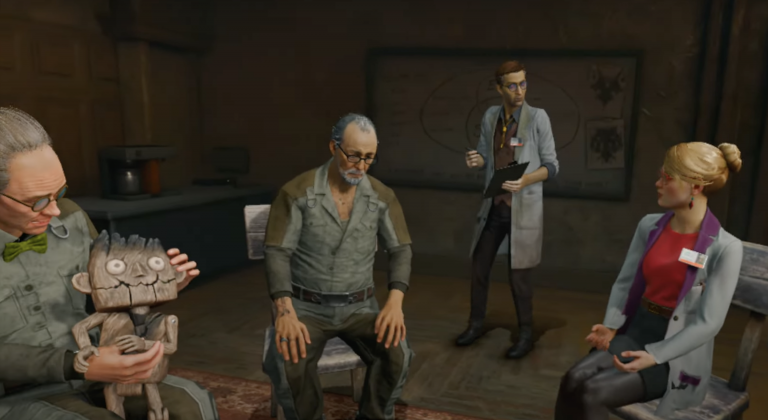
Batman: Arkham Shadow may be the newest installment in a long-running gaming franchise, but it offers something refreshingly unique.
The game, recently released exclusively for virtual reality on Meta Quest 3/3S, is serious about responsibly exploring its characters’ minds. Terms like psychotic, for example, aren’t tossed around when characters are violent.
And once Batman enters Blackgate Prison under an alias, on a mission to find the villain Rat King before he strikes, he grows conflicted about his understanding of what motivates the criminals he encounters. As it turns out, when Batman attends a group therapy session led by Dr. Harleen Frances Quinzel (later known as Harley Quinn), he has just as much to say about childhood trauma as the other inmates.
These and other choices were intentional, says Arkham Shadow director Ryan Payton. In 2023, he discovered a series of GQ videos featuring psychiatrist Dr. H. Eric Bender breaking down mental health scenes from popular movies and television, including clips from Joker.
Bender notes that the film “overplays the idea that violence and mental illness are linked.” Indeed, people who live with mental illness are far more likely to become victims of violence than to perpetrate it.
Bender had previously observed that the game Batman: Arkham Asylum, labeled the Joker as psychotic when, in Bender’s opinion, the character was psychopathic. This difference might seem insignificant to some, but Bender argues that incorrect labels and diagnoses can influence how people see those with severe mental illness, and how those living with such conditions see themselves.
Last fall, Payton asked Bender to consult on Arkham Shadow so that the game authentically depicted the characters’ different emotional struggles, without playing into dangerous tropes or stereotypes about mental illness.
The shadow in the game’s title has multiple meanings, hinting at menacing themes while also invoking the concept of the Jungian shadow, or unconscious negative beliefs about ourselves that we project onto others. If ever there was a superhero that could shoulder such treatment, it was Batman, Payton says.
“Eventually in the game, you come face-to-face with your own shadow, through many different lenses.”
“Eventually in the game, you come face-to-face with your own shadow, through many different lenses,” Payton says.
But before Payton and Bender met, both of them had powerful experiences that informed the way they thought about mental health in popular entertainment.
Payton recalls playing Final Fantasy VI as a teenager, which depicted a character going through mental health challenges.
“The feelings I was feeling [were] not something I would normally feel playing a lot of other video games I could’ve pulled off the shelf,” Payton says. Since then, he says he’s prioritized accurately portraying mental health and other sensitive topics in video games.
One of Bender’s a-ha moments came while making a presentation at Comic-Con about media depictions of mental health when someone in the audience asked: “When am I going to see a character with mental illness who does not make me feel like I will turn into a villain?”
For Arkham Shadow, Bender provided Payton feedback on numerous storylines and character traits. This included tense, argumentative exchanges between Dr. Quinzel and Dr. Jonathan Crane, which were written to illustrate the strengths and limitations of different types of therapeutic approaches.
Bender also explained in detail why it could be extremely damaging for one character to hear as a child that they need to bottle up their anger and be good, as depicted in the game’s flashbacks.
In total, the game features a half-hour of recorded conversation about mental health and well-being between various characters. There’s even “tender moments,” Payton says.
Still, Arkham Shadow remains an action game and stays true to the Batman universe. Blackgate Prison doesn’t suddenly become a safe, high-quality mental health institution, upending decades of stereotypes about treatment facilities. Nor does Batman suddenly turn into a pacifist, eager to practice conflict resolution with his enemies.
But within these bounds, Bender and Payton feel like they’ve accomplished something meaningful.
“I’d like to think after people play Batman: Arkham Shadow that they’ve got a different perspective,” Payton says.




















0 Comments